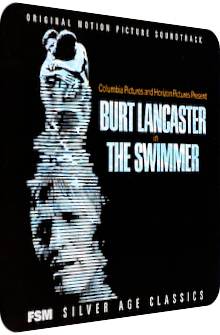
Marvin Hamlisch
The Swimmer
1968
“Pool by pool they form a river – all the way to our house” is one of the greatest lines of any movie, especially so when the Exotica way of life runs through the veins of the music lover and flick fan. It is uttered by Burt Lancaster in Sydney Pollack’s surreal Connecticut-based movie The Swimmer, released in 1968 and brought to life by one Marvin Frederick Hamlisch (1944–2012), a young and talented twenty-something year old aspiring composer who delivers his first ever work with this sparkler.
Released in 2006 on CD by Sony Music for the first time, this Space-Age/Lounge/Exotica synergetic aurora can be enjoyed in pristine quality. And what a joyride it is: from orchestral blotches over cocktail splashes to besotted longitudinal cataracts of love, The Swimmer breathes hedonism, good life… and terrible missteps of a dark past which are – in both the movie and the soundtrack – only hinted at by means of cryptic allusions and dark motifs. Meanwhile, the premise of the movie is astutely mirrored by the material: a middle-aged but well-groomed and equally trained man visits several of his friends for the first time in years. Swimming in their pool and overlooking a string of other cyan pools, he decides to swim through all of them until he reaches his own abode. As crazy and childish a thought, as focused the swimmer is in realizing this dream. And the music lives up to his undertaking. Here is a closer look at the soundtrack without movie-related spoilers.
Superbly smooth, mildly paradisiac, almost torn apart by a dark contrabass scar, the opener is unsurprisingly the Theme From The Swimmer. It naturally recurs throughout the movie and might not exude the Exotica feeling one might wish for, but the polyphonous flutes, fittingly aquatic harp twangs and remote glimmers of hope make it a great theme, albeit one that will never be recognized as one of Hollywood’s greatest motifs. The theme shifts more toward a nostalgic mood, not preparing the listener of the surreal things to come, both in regard to the movie and the shapeshifting soundtrack itself.
The following Easy Four / Bubbles shows this more than splendidly: a cool swimming pool afternoon mélange of vibraphone icicles, wonderfully insouciant flutes, silkened hi-hats and gleaming organs, this is proto-Lounge music juxtaposed to backing strings. The cross-linkage works perfectly since the orchestra never takes over completely, letting the humble sunlit scenery vaporize the scents of that quartet sound. The following four minute symphony compresses quite a few sceneries of the movie, but all of these work in tandem; The Dive is elysian Space-Age par excellence, Don’t Come Back is a brass-heavy blow supercharged with – of all things! – happiness, Slow Walk offers a bokeh effect of verdured strings, with The Horse showcasing the exhilarative power of a special kind of horse race. It’s not one man sitting on a horse, but racing against that animal.
Lucinda River / Two People oscillates between Space-Age climes yet again, with softened strings aplenty. The Swimmer Theme is prominently interwoven, the wideness is aggrandized, the harp’s liquid photometry adds delight and doleful gravity to the scenery, with the second half adding a burst of happiness that cannot overcome the melancholia that remains the strongest of all forces. It is the task of the magically uplifting Together / Hurdles to put a smile on the listener: the warped strings are fantastic, the stacked horns are balmy, and those who know Dominic Frontiere’s romance classic Love Eyes (1960) will surely succumb to this high point of Marvin Hamlisch’s soundtrack. While Julie, Julie / The Little Flute / The Goodbye is a short Exotica zoetrope made of guiro-infused string cavalcades and a boy’s Oriental flute solo, Carnival takes the listener to another – now crowded – pool scenery. It is here where the intrinsic flavor shifts yet another time. Car horn harpsichords and swinging brass layers provide the background for a party of yuppies and rich people. This is an eclectic gem comprising of Dixieland vestiges, big band sceneries and all sorts of colors. Indeed, Peter Reno’s carefree library music odyssey Colours (1969) comes to mind.
The appendix Lovely Hair emits the same kind of tropical swing awash with aureate piano stabs and melodious Easy Listening granulomas, but Down The Steps / You Loved It / On The Road marks the ominous shift; the first two compositions of the triptych are somewhat attached to the syringa luminosity of the vivacious whorl, the road piece however shows the proclivity of civilization and technocracy for shattering one's dreams, a scheme which finds its culmination in the condensed amalgamation called My Kids Love Me / Traveling Home / Closer To Home / Home / Marcia Funebre. Mountainous and increasingly pressing, these five pieces evoke the last moments of freedom and hope before the bell-accentuated finale hits those listeners hard who are aware of the movie. A reprise of the Theme From The Swimmer rounds off the soundtrack.
I am a big fan of the movie, so the soundtrack must be similarly great. Or is it vice versa? Whatever the right sequence of order may be, two things are certain: firstly this album can be enjoyed without knowing even one single instance of the film, and secondly Hamlisch’s inaugural soundtrack itself is not particularly enchanting per se. What it lacks in sophisticated fugues and preludes, it gains in weight when it comes to the flavors of Space-Age, Exotica and heck, even Psychedelica. The basic problem of this album – other than it is just a soundtrack – is the stylistic stumbling and tumbling: after a doleful orchestral piece, a sunburst occurs and illumines the swimming pool of the mind until its turquoise clarity becomes a Caribbean haze before venturing back to obscure segues. The span of a two-hour film condensed to a soundtrack below the 40-minute mark, something’s got to give, and so the interested listener might perceive Hamlisch’s pieces as a flurry, a void leading to hedonism and fear. Funny, as these things are exactly two notions of the big picture.
What I adore about the soundtrack is the quality of the Easy Listening material that is played near the several pools. Yes, Hamlisch was not overly proud of these sections in hindsight once he became a world famous composer, but it is these sparks such as Easy Four / Bubbles or Carnival that unite the sound of Jazz quartets with cocktail lounges before orchestral backdrops. Likewise, the Exotica factor grows ever bigger in short pieces such as Julie, Julie and The Little Flute. The Swimmer is a great work, and once you can accept the weakness of the very material that favors a stop-and-go motion and acceleration from mild to wild and back again in just a few minutes, you are in for a treat. As for the movie? It is one of those cult movies whose beauty can only grow.
Exotica Review 365: Marvin Hamlisch – The Swimmer (1968). Originally published on Aug. 9, 2014 at AmbientExotica.com.
